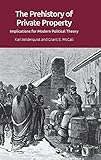The Prehistory of Private Property : Implications for Modern Political Theory / Karl Widerquist, Grant McCall.
Material type: TextPublisher: Edinburgh : Edinburgh University Press, [2022]Copyright date: ©2021Description: 1 online resource (288 p.)Content type:
TextPublisher: Edinburgh : Edinburgh University Press, [2022]Copyright date: ©2021Description: 1 online resource (288 p.)Content type: - 9781474447423
- 9781474447447
- online - DeGruyter
| Item type | Current library | Call number | URL | Status | Notes | Barcode | |
|---|---|---|---|---|---|---|---|
 eBook
eBook
|
Biblioteca "Angelicum" Pont. Univ. S.Tommaso d'Aquino Nuvola online | online - DeGruyter (Browse shelf(Opens below)) | Online access | Not for loan (Accesso limitato) | Accesso per gli utenti autorizzati / Access for authorized users | (dgr)9781474447447 |
Frontmatter -- CONTENTS -- PREFACE -- ACKNOWLEDGMENTS -- 1. Introduction -- Part One The inequality hypothesis -- 2. Hierarchy’s Apologists, Part One: 5,000 Years of Clever and Contradictory Arguments that Inequality is Natural and Inevitable -- 3. Hierarchy’s Apologists, Part Two: Natural Inequality in Contemporary Political Philosophy and Social Science -- 4. How Small-Scale Societies Maintain Political, Social, and Economic Equality -- Part Two The market freedom hypothesis -- 5. The Negative Freedom Argument for the Market Economy -- 6. The Negative Freedom Argument for the Hunter-Gatherer Band Economy -- Part Three The individual appropriation hypothesis -- 7. Contemporary Property Theory: A Story, a Myth, a Principle, and a Hypothesis -- 8. The History of an Hypothesis -- 9. The Impossibility of a Purely A Priori Justification of Private Property -- 10. Evidence Provided by Propertarians to Support the Appropriation Hypothesis -- 11. Property Systems in Hunter-Gatherer Societies -- 12. Property Systems in Stateless Farming Communities -- 13. Property Systems in Ancient, Medieval, and Early Modern States -- 14. The Privatization of the Earth, 1500–2000 ce -- 15. The Individual Appropriation Hypothesis Assessed -- Conclusion -- 16. Conclusion -- References -- Index
restricted access online access with authorization star
http://purl.org/coar/access_right/c_16ec
Examines the origin and development of the private property rights system from prehistory to the present dayTraces the origin and development of the private property rights system from prehistory to the present day showing that it was not the product of 'appropriation' and 'voluntary trade' but of a long history of violent aggressionReviews the long history of contradictory explanations why inequality is supposedly natural and inevitable or an inevitable feature of a free societyUses anthropological evidence to show that some societies have maintained strong equality and extensive freedomAddresses the negative-freedom argument for the market economy by showing that the hunter–gatherer band economy has much more extensive negative freedomThis book debunks three false claims commonly accepted by contemporary political philosophers regarding property systems: that inequality is natural, inevitable, or incompatible with freedom; that capitalism is more consistent with negative freedom than any other conceivable economic system; and that the normative principles of appropriation and voluntary transfer applied in the world in which we live support a capitalist system with strong, individualist and unequal private property rights. The authors review the history of the use and importance of these claims in philosophy, and use thorough anthropological and historical evidence to refute them. They show that societies with common-property systems maintaining strong equality and extensive freedom were initially nearly ubiquitous around the world, and that the private property rights system was established through a long series of violent state-sponsored aggressions.
Mode of access: Internet via World Wide Web.
In English.
Description based on online resource; title from PDF title page (publisher's Web site, viewed 29. Mai 2023)


